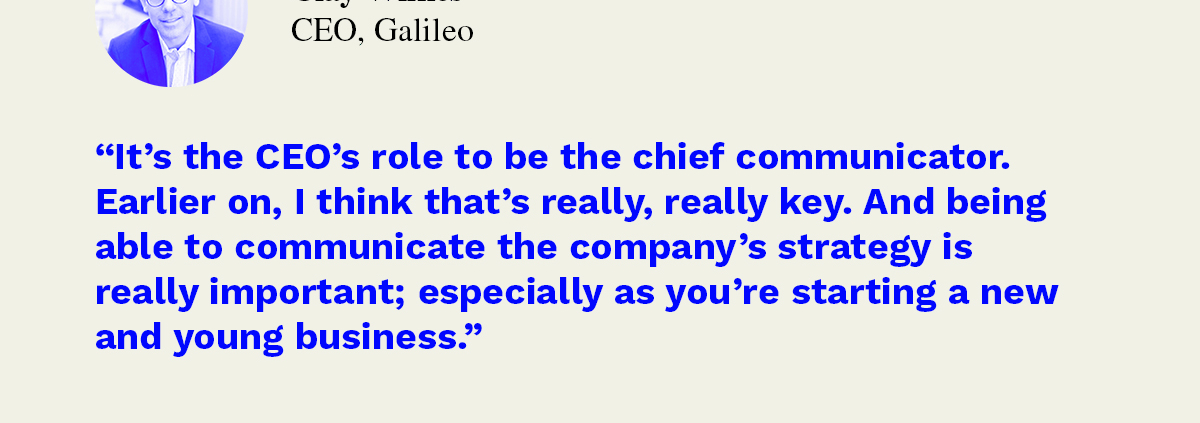8 top communication tips from unicorn CEOs
Managing a high-growth organisation is probably one of the greatest challenges a leader can take on. Startup CEOs wear many hats that they take on and off as company priorities change. One hat, far too often, is left in the cupboard: The hat of the communicator. This is a mistake. Communicating effectively is integral to the success of any startup – as confirmed by the unicorn CEOs we interviewed for our podcast series.
Experienced unicorn CEOs acknowledge that the importance of communication skills is overlooked in the early days. Looking back, Clay Wilkes, founder and former CEO of global payments platform Galileo, which supports 70 out of the top 100 most valuable fintech companies in the world today, says that if he could travel back in time, he would challenge his younger self to communicate more clearly, succinctly and “specifically more directly”. “It’s the CEO’s role to be the chief communicator. Earlier on, I think that’s really, really key. And being able to communicate the company’s strategy is really important, especially as you’re starting a new and young business,” says Clay.
Clearbank CEO Charles McManus adds that one of the key communication techniques he has learned has been what he calls “authentic storytelling”. “You can get lost in facts. The ability to story tell and make sense of it all, and then interject facts is something a lot of us, as leaders, actually try to do. Can we relate and tell that story and interject facts rather than lose the audience in terms of boring, dull, boffin-like facts?”.
Simplicity is another key characteristic of great communications. Martina King, CEO of Featurespace, illustrates the power of simplicity really well: “If I throw five balls at you, how many do you think you’ll catch? But if I throw one, there’s a fair chance you’ll actually catch it. So when you’re thinking about your communication, what’s the one message that you want to try and convey?” Charles McManus agrees. For him, it is critically important to focus on the essentials, especially in meetings with key stakeholders who can decide your young company’s fate: “You’ve got five minutes with God. What points are you going to make in your five minutes? And you mustn’t come out and walk down the street and say, ‘If I only said X or Y’. The five minutes with whomever it is are the most important of your life.”
Learn by doing, and falling over
Most unicorn CEOs are experts in their own technical field. Communicating is frequently not part of their core competencies. However, “natural communicators” are a myth. Communication can be learned, it is a craft that improves with practice. “If you don’t spend time on it, you’ll lose the skill and if you don’t spend time with it, you can’t make it better. So, like anything, you’ve got to work on it,” explains Avinash Rugoobur, President & Chief Strategy Officer of Arrival.
Founder and CEO of Octopus Energy, Greg Jackson’s advice for spokespeople in younger companies is to consider the legacy of their words as the company grows. “As the spokesperson, I certainly moved from a world in which I would just throw hand grenades at the old guard to a world in which, actually, my job is not to do that but is to build a really positive vision of the future for our company and for our society. And I think, you build that platform and you’ve got to use it wisely,” explains Greg.
For Mirakl co-founder, Adrien Nussenbaum it’s critical to support everything you do with communications consistently and in a strategic manner: “The key to successful communication, beyond being creative, is to consider it as a programme and not just as a one-time project. And if you approach it like that, it helps to solve all the short-term dilemmas that you will have around ROI. It’s really something that needs to be deeply integrated in everything you do.”
Mastering internal communications
At a time when many companies are born remote, like Workato, ensuring employees stay in the communications loop is a huge task. For its founder and CEO, Vijay Tella, “Communication and being connected is the hardest challenge a company faces. It’s been a big challenge in every company that I was part of. There is always this sense of people being able to connect with each other at the watercoolers – but people in remote areas don’t feel as connected. I’ve never found a place where we felt that we communicated enough, and we did enough to get everybody on the same page.” It’s essential to find ways to keep staff informed and build a sense of belonging, whether it is by hosting ‘Town Hall’ meetings, arranging weekly Zoom calls or creating open channels of communication where employees can ask anything to the leadership of the organization.
CEOs may need to adapt their communication style to be clearer, impactful and avoid any potential ambiguity when addressing their staff and maintaining team spirit. “Your communication has to be far more absolute and black and white, because by the time it’s filtered down through the business, you cannot allow any interpretation of anything that’s not well-defined,” says Poppy Gustaffson, co-CEO of Darktrace. Vague communication fails so ensure your message is clear.
The must-read communications guide for startup leaders
These are just a few excerpts from our book Growing without borders: The unicorn CEO guide to communication and culture. We have compiled valuable advice from the leaders of fifteen startups that have reached unicorn status into an actionable guide for business leaders.
If you want to learn from their experiences, you can download our book here. Or you can listen to the full interviews with each one of them on our ‘Without Borders’ podcast, where you can also listen to new unicorn leader content that is not featured in the book like the recent chats with Pedro Bados, co-founder and CEO of Nexthink, and Mariano Gomide de Faria, co-founder and co-CEO of VTEX.




